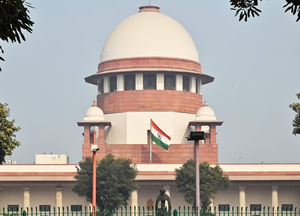New Delhi: The Supreme Court on Monday refused to entertain a public interest litigation (PIL) seeking a direction to the Urban Development Department of Maharashtra government to designate BMC (Brihanmumbai Municipal Corporation) as the sole and centralised planning and sanctioning authority for the city of Mumbai.
A bench of Justices Surya Kant and Ujjal Bhuyan asked the petitioner, Earth, a non-government organisation, to approach the Bombay High Court.
Sensing the disclination of the apex court to entertain the plea, the petitioner’s counsel sought liberty to withdraw the PIL. Ultimately, the matter was dismissed as withdrawn by the apex court.
The PIL said that Section 40 of the Maharashtra Regional & Town Planning (MRTP) Act, 1966, which empowers the state government to appoint a Special Planning Authority (SPA) for notified areas, was enacted before the Constitution (74th Amendment) Act, effective June 1993.
“This amendment introduced Part IXA, titled ‘The Municipalities’ (Articles 243P to 243ZG along with Twelfth Schedule), establishing the framework for the constitution, composition, and responsibilities of Municipalities. However, Section 40 was not amended to explicitly define the roles, powers, and functions of a SPA concerning matters outlined in Schedule XII,” the plea added.
Despite this lack of clarity, the Urban Development Department proceeded to appoint multiple SPAs, which diluted the planning and sanctioning powers of BMC, contented the petition, adding that “this ambiguity has adversely affected BMC’s ability to address key issues in Schedule XII, including urban planning, land use regulation, building construction, road and bridge maintenance, and slum improvement”.
The PIL, filed through advocate Dilip Annasaheb Taur, said that the approach has hindered urban development and limited citizens’ access to amenities due to a lack of transparency and consistency in the approval processes of the SPAs, the transfer of public amenities, and the execution of the 18 responsibilities outlined in the Schedule XII.
“The insufficient transparency in transferring amenities to the BMC obstructs effective urban planning and negatively impacts residents, depriving them of essential services and facilities,” it said.
The BMC established under the Mumbai Municipal Corporation Act of 1888 (MMC Act), serves as both the governing civic body and the planning authority for Mumbai in accordance with the MRTP Act, 1966.
The petition said that the existence of multiple planning authorities (without a clear delineation of duties) has led to certain operational inefficiencies, and the planning and sanctioning process of the Slum Rehabilitation Authority (SRA) is laced with “major deficiencies”.
–IANS


Comments are closed, but trackbacks and pingbacks are open.